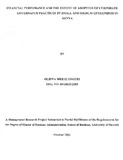| dc.description.abstract | The study sought to examine the financial performance and extent of adoption of corporate governance practices of SMEs in Kenya. The review was undertaken in order to eliminate duplication of what has been done and provide a clear understanding of existing knowledge base in the problem area. The literature review is based on authoritative, recent, and original sources such as journals, books, thesis and dissertations. Descriptive survey design was used to structure the research. The population of study was the registered SMEs in the manufacturing sector in Kariobangi Light Industries that have adopted corporate governance practices.
The study utilized a combination of both quantitative and qualitative techniques in the collection of data. The study targeted 30 SMEs in Kariobangi Light Industries. The owners or managers of the SMEs were the respondents in the study. Out of the 30 questionnaires sent out, 27 questionnaires were returned completed, a 90.0% response rate.
The primary data was collected by administering semi-structured structured questionnaires to the sampled respondents. A self-administered questionnaire was used since the level of understanding of the questions by the respondents is expected to be relatively high. The questionnaire was considered effective since it is not time consuming, considering that all respondents are based at the market centers in the study area. The questionnaire was pilot tested on ten randomly selected respondents before they are administered to ensure that it is understood in its correct perspective, in order to meet the research objectives.
Data pertaining to the extent of adoption of corporate governance by SMEs in Kenya was conducted using descriptive statistics, which includes measures of central tendency, measures of variability and measures of frequency among others. Descriptive statistics help to simplify large amounts of data in a sensible way. Each descriptive statistic reduces lots of data into a simpler summary.
The data was analyzed by employing descriptive statistics such as percentages, frequencies and tables. Statistical Package for Social Sciences (SPSS) was used to aid in analysis. The researcher preferred SPSS because of its ability to cover a wide range of the most common statistical and graphical data analysis and is very systematic. Computation of frequencies in tables was used in data presentation. The information is presented and discussed as per the objectives and research questions of the study.
Findings of the study indicate that some SMEs that participated in the study had adopted the following corporate governance practices: formation of board of directors; development and institutionalization of a system for evaluating board and individual directors; development of Bylaws to govern board meetings; holding four or more regular board meetings per year; use of cumulative voting for election of directors; choosing shareholder meeting dates and locations to encourage attendance; and ensuring board approval for related party transactions.
The findings further show a positive relationship between the following corporate governance practices and profitability of the SMEs that participated in the. study: availability of board of directors; existence of a system of evaluating board and individual directors; existence of Bylaws to govern board meetings; and use of cumulative voting for elections of directors.
The findings also show that adoption of the following corporate governance practices did have a direct influence on profitability of the SMEs that participated in the study: holding four or more regular board meetings per year; the choice of shareholder date or location to encourage attendance; and board approval requirement for related party transactions.
The relevance of corporate governance cannot be over emphasized since it constitutes the organizational climate for the internal activities of a company. In Kenya corporate governance can greatly assist the SME sector by infusing better management practices, stronger internal auditing and greater opportunities for growth. Corporate governance brings new strategic outlook through external independent directors; it enhances firms' corporate entrepreneurship and competitiveness. It is not a threat to value creation in entrepreneurial firms if the guidelines on corporate governance are properly applied. | en_US |

